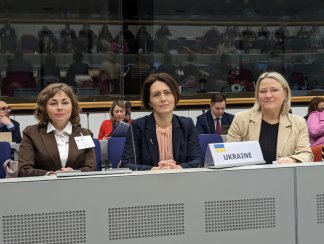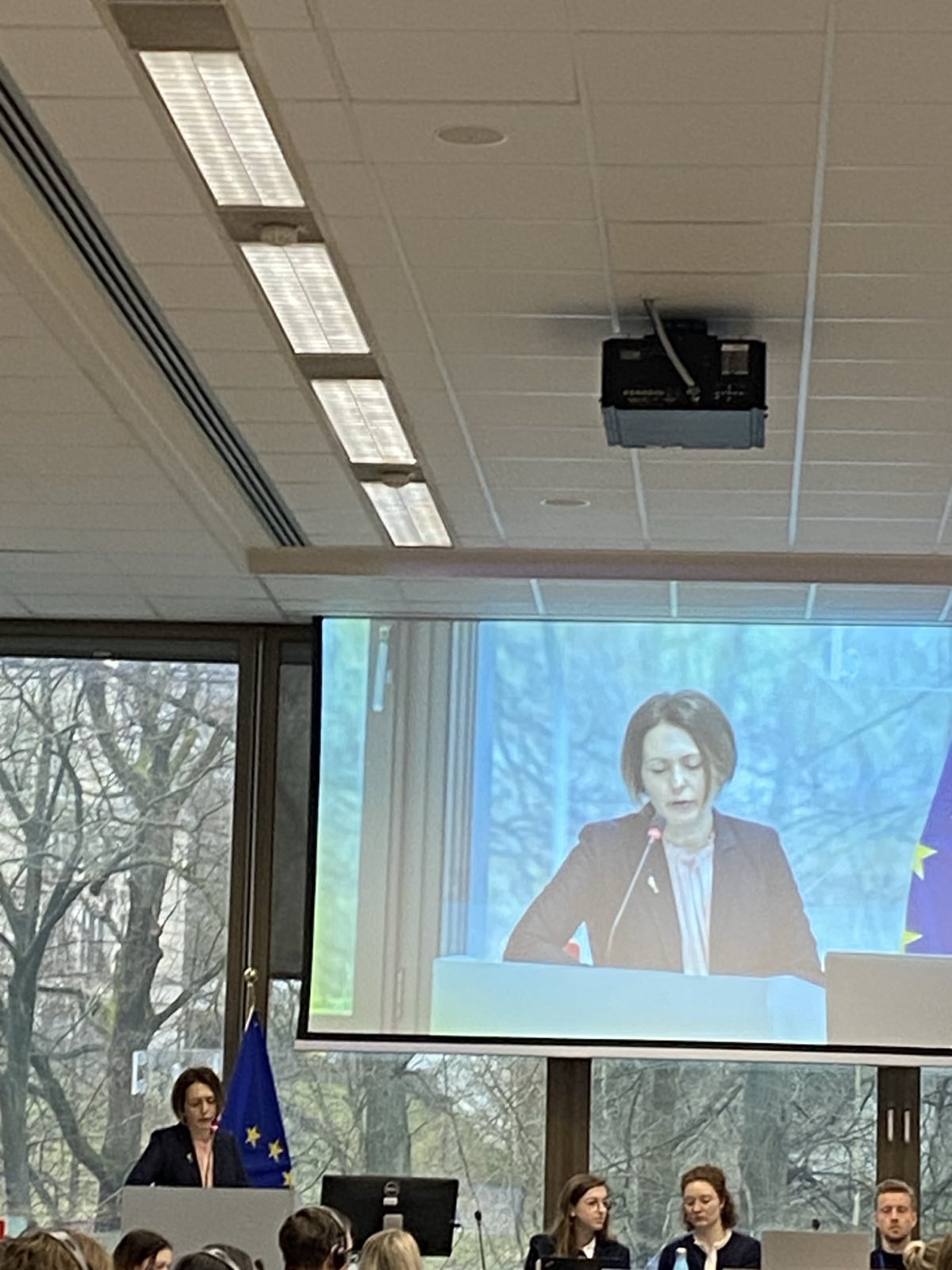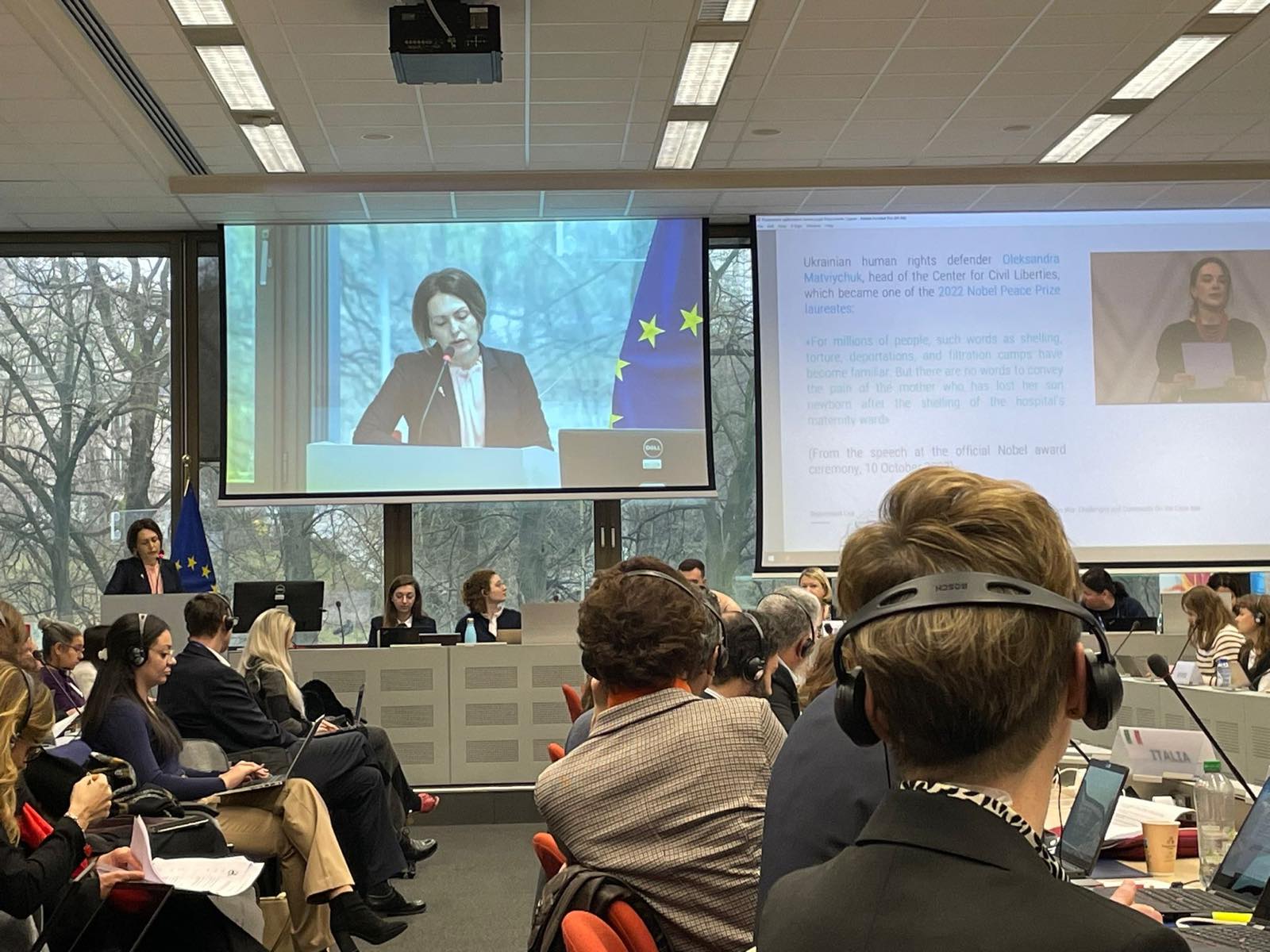Contact center of the Ukrainian Judiciary 044 207-35-46

In most cases of children's return to Ukraine, foreign courts have ruled that the child should not be returned due to security concerns arising from the ongoing war. However, when considering such cases, foreign judges should understand that Ukraine expects the return of children when it is safe to do so, because children are the future of our country. This was emphasised by Supreme Court Judge of the Civil Cassation Court Yuliia Cherniak at the Annual meeting of the contact points of the European Judicial Network in Civil and Commercial Matters.
This year, the organisers of the event planned to discuss the main challenges for Ukrainian courts and the Ministry of Justice of Ukraine in applying the Hague Conventions in civil and family cases during the period of martial law in Ukraine.
Yuliia Cherniak delivered a presentation on "International child abduction and child protection during the Russian-Ukrainian war: challenges and comments on the case law".
The judge informed that, according to the Office of the Prosecutor General, since 24 February 2022, more than 500 Ukrainian children have been killed, more than 1,200 injured, millions of Ukrainian children have been internally displaced, and almost 1.3 million children have migrated and are living in the European Union. According to the Government, more than 19,500 Ukrainian children have been forcibly deported to russia.
Taking into account the expertise of the European Judicial Network, the speaker focused on analysing how the serious challenges faced by Ukrainian children, their parents and the national courts of Ukraine as a result of the Russian-Ukrainian war are addressed by the provisions of the two Hague Children's Conventions: The 1980 Convention on the Civil Aspects of International Child Abduction and the 1996 Convention on Jurisdiction, Applicable Law, Recognition, Enforcement and Co-operation in respect of Parental Responsibility and Measures of Protection of Children.

Yuliia Cherniak identified the following key issues for discussion:
The judge noted that in most of the cases of applications for the return of a child to Ukraine considered in 2022-2023, foreign courts had ruled that the child should not be returned for security reasons (due to the war in Ukraine), applying Article 13(1)(b) of the 1980 Hague Convention.
The security situation and restrictions related to the conduct of hostilities and their aftermath have become an additional element of proof in cases of return of the child and determination of the child's place of residence.
According to the practice of the Supreme Court, the mere fact that martial law is in force on the territory of Ukraine is not a sufficient reason to satisfy a claim for the return of a child from Ukraine to the state of his or her former habitual residence. Each case requires the court to examine the whole history of the child's family relations with each parent and to identify and compare a number of factors characterising the child's life in the state of his or her former habitual residence and in the state to which he or she has been removed or detained.
Regarding her work as a contact judge for Ukraine in the International Hague Network of Judges (IHNJ), Yuliia Cherniak noted a positive trend: more and more often, a foreign court judge considering an application for the return of a Ukrainian child requests information from the Ukrainian coordinating judge through the International Hague Network of Judges on whether a certain region in Ukraine (city or town) is under russian occupation (or whether hostilities are taking place in that territory). The list of territories in which hostilities are (were) conducted or temporarily occupied by russia was approved by the order of the Ministry of Reintegration of the Temporarily Occupied Territories of Ukraine of 22 December 2022, and it is constantly updated.
The speaker noted that in view of the objective circumstances (war, removal of a child abroad and his or her adjustment to a new environment), such a way of protecting the rights of parents to access and contact with a child abroad as the application of interim measures in accordance with Articles 5 and 11 of the 1996 Hague Convention, which is a kind of analogue to the institution of interim measures in Ukrainian civil proceedings, becomes particularly relevant. Using specific examples, Yuliia Cherniak showed that in 2022-2023 the Supreme Court resolved the debate in favour of the possibility of using this institution in cases of return of a child under the 1980 Hague Convention and determination of the child's place of residence under the 1996 Hague Convention.
Taking into account the official position of the National Social Service of Ukraine (the central authority of Ukraine under the 1996 Hague Convention), the judge emphasised that Ukrainian children are not refugees, they are leaving Ukraine because of the unrest caused by russian aggression (the so-called external threat), and therefore international jurisdiction in family cases involving children should not be determined by the special rule of Article 6, but by the general rule of jurisdiction of Article 5 of the 1996 Hague Convention, i.e. the habitual residence of the child.

Yuliia Cherniak illustrated the effect of the rule that "international jurisdiction follows the child's habitual residence" by looking at the case law of the Supreme Court in determining the child's place of residence. Both of these cases concern a child - a citizen of Ukraine - who left Ukraine for another state, but the time when this departure took place and other factual circumstances in these cases differ. In the first case, as the child had acquired his or her habitual residence abroad at the time of the opening of the proceedings, the case was not within the jurisdiction of the Ukrainian court and the proceedings were therefore terminated in accordance with Article 255(1)(1) of the Civil Procedure Code of Ukraine. In the second case, since the child's habitual residence at the time of the commencement of the proceedings was in Ukraine, the Ukrainian court establishes jurisdiction in accordance with Article 5 of the 1996 Hague Convention and Article 75(1) of the Law of Ukraine "On Private International Law" (the rule of invariability of international jurisdiction in the course of proceedings).
Russia's military actions in Ukraine have led to the emergence of new categories of cases, in particular the establishment of the fact of a child's birth in the temporarily occupied territory of Ukraine. The speaker analysed the conclusion of the Supreme Court formulated in the light of the Namibia exception and ECHR case law: "Documents issued by bodies and institutions (in particular, civil registry offices) located in the temporarily occupied territory of Ukraine may, as an exception, be taken into account by the court and evaluated together with other evidence in their entirety and in connection with each other when considering a case in accordance with Article 315 of the Civil Procedure Code of Ukraine".
The judge emphasised the impossibility of "speeding up" adoption or implementing a "simplified procedure" for adoption under martial law. Adoption can only take place in areas where there are no hostilities, where children's services and courts operate, and only for children whose parents or other relatives have been identified.
In addition, Yuliia Cherniak stressed that when considering the application of international conventions on the protection of Ukrainian children, foreign judges should understand that Ukraine expects Ukrainian children to return when it is safe to do so, because children are the future of Ukraine. "No children - no state! That is why it is so important that the European Commission understands this message. As set out in the Council of Europe's 2023 Reykjavik Declaration on the situation of children in Ukraine: Together, let us keep doing our utmost to bring all Ukrainian children back home," the judge said.
The annual meeting of the contact points of the European Judicial Network in Civil and Commercial Matters was organised by the Directorate-General for Justice of the European Commission and took place in Brussels (the Kingdom of Belgium) on 29 and 30 January.
The European Judicial Network in Civil and Commercial Matters facilitates and supports relations between national judicial authorities and thus enhances the resolution of cross-border disputes.
Presentation by Yuliia Cherniak - https://supreme.court.gov.ua/userfiles/media/new_folder_for_uploads/supreme/2024_prezent/Y_%20Chernyak_The_EJN_22nd_Annual_Meeting.pdf.